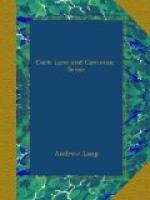room dore is opened, and an apparition,
in shape
of a country tradsman, came in, and opened the
courtains without speaking a word’. The
doctor determined not to begin a conversation, so
the apparition lighted the candles, brought them to
the bedside, and backed to the door. Dr. Rule,
like old Brer Rabbit, ‘kept on a-saying nothing’.
’Then the apparition took an effectuall way
to raise the doctor. He caryed back the candles
to the table, and,
with the tongs, took doun
the kindled coals, and laid them on the deal chamber
floor.’ Dr. Rule now ’thought it
was time to rise,’ and followed the appearance,
who carried the candles downstairs, set them on the
lowest step, and vanished. Dr. Rule then lifted
the candles, and went back to bed. Next morning
he went to the sheriff, and told him there ‘was
murder in it’. The sheriff said, ‘it
might be so,’ but, even if so, the crime was
not recent, as the house for thirty years had stood
empty. The step was taken up, and a dead body
was found, ’and bones, to the conviction of
all’. The doctor then preached on these
unusual events, and an old man of eighty fell a-weeping,
confessing that, as a mason lad, he had killed a companion,
and buried him in that spot, while the house was being
built. Consequently the house, though a new one,
was haunted from the first, and was soon deserted.
The narrator, Mr. Mercer, had himself seen two ghosts
of murdered boys frequently in Dundee. He did
not speak, nor did they, and as the rooms were comfortable
he did not leave them. To have talked about the
incident would only have been injurious to his landlady.
’The longer I live, the more unexpected things
I meet with, and even among my own relations,’
says Mr. Wodrow with much simplicity. But he
never met with a ghost, nor even with any one who had
met with a ghost, except Mr. Mercer.
In the same age, or earlier, Increase Mather represents
apparitions as uncommonly scarce in New England, though
diabolical possession and witchcraft were as familiar
as influenza. It has been shown that, in nearly
forty years of earnest collecting, Mr. Wodrow did
not find a single supernatural occurrence which was
worth investigating by the curious. Every tale
was old, or some simple natural cause was at the bottom
of the mystery, or the narrative rested on vague gossip,
or was a myth. Today, at any dinner party, you
may hear of bogles and wraiths at first or at second
hand, in an abundance which would have rejoiced Wodrow.
Charles Kirkpatrick Sharpe vainly brags, in Law’s
Memorialls, that ’good sense and widely diffused
information have driven our ghosts to a few remote
castles in the North of Scotland’ (1819).
But, however we are to explain it, the ghosts have
come forth again, and, like golf, have crossed the
Tweed. Now this is a queer result of science,
common-sense, cheap newspapers, popular education,
and progress in general. We may all confess to
a belief in ghosts, because we call them ‘phantasmogenetic
agencies,’ and in as much of witchcraft as we
style ‘hypnotic suggestion’. So great,
it seems, is the force of language! {303}




